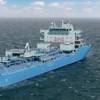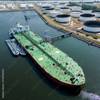IBF Revises Transit Corridors in Gulf
Following a meeting of the JNG/ITF Secretariat in London on Tuesday 13 January and agreement reached between the parties of the IBF on 26 January, the International Bargaining Forum has agreed to amend the "High Risk Area" covering the major part of the Gulf of Aden by adopting the revised UKMTO Transit Corridors.
From 1 February 2009 all ships entering the "High Risk Area" are directed to transit the Gulf by following the new East and West bound transit lanes, which have been adopted following the increase in number and re-positioning of warships in the region. The new two lane system will also assist in preventing possible collision scenarios.
The agreement will continue to provide that seafarers on ships covered by IBF Agreements will receive a bonus equal to 100% of their basic wage while the vessel is in transit. The normal rates of death and disability compensation for seafarers will continue to be doubled during this period.
All parties recognized the effectiveness of designated channels through the Gulf and the continued intervention of armed naval forces in the region was welcomed. It was therefore agreed that seafarers on ships that used these corridors for the transit should continue to be expected to serve on their vessels during transits. However, seafarers that served on ships that chose not to use the designated corridors should have the right to refuse to make the transit and to be repatriated at owners’ expense.
A copy of the revised Memorandum of Agreement adopted by the IBF Committee is attached and it sets out the new co-ordinates of the IBF "High Risk Area" from 1 February.
Giles Heimann, Deputy Secretary General of IMEC said following the agreement: "While we are pleased that continuing attention is being given to the very serious problem of piracy in the Gulf of Aden, and hope that with the increase in number of warships in the region and the introduction of the new transit lanes, vessels will be more protected from aggression, we continue to monitor the situation very closely. We will likewise continue to respond to any further developments as they arise and have already agreed to a review of the "High Risk Area" at the end of February by which time the effectiveness of the new channels will be much clearer."














